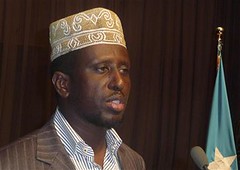
The newly-elected President of Somalia, Sheikh Sharif Sheikh Ahmed. He was a former leader of the Union of Islamic Courts. His election has been welcomed by the African Union and other international bodies.
Originally uploaded by Pan-African News Wire File Photos
Saturday 7 February 2009 (12 Safar 1430)
Act now on Somalia
Simon Tisdall
The Guardian
The election of a moderate Islamist as Somalia’s president has given Barack Obama an early opportunity to redeem his pledge to forge new relationships with the Muslim world. But he will have to move quickly because the government now being formed by Sheikh Sharif Ahmed may yet be strangled at birth.
After winning last weekend’s vote in Somalia’s Parliament-in-exile in Djibouti, Ahmed not so much offered as threw an olive branch at Obama. “America has become a force which supports peace ... We think the American view of Somalia is now positive,” he told Egypt’s El-Shorouk newspaper.
Ahmed’s statement crowned a remarkable political turnaround by a man who led the Islamic Courts Union until it was driven from power in 2006 by Ethiopian forces with Washington’s blessing. The US claimed ICU elements were linked to Al-Qaeda. But the Courts’ replacement — the weak, corrupt, Western-backed Transitional Federal Government (TFG) — accelerated Somalia’s descent into anarchy.
Ahmed went on to create the moderate Alliance for the Re-Liberation of Somalia, causing Islamist hard-liners to break away. One group, led by Sheikh Hassan Aweys, is based in Eritrea. Another, more potent force, the Al-Shabaab militia, continued to fight the Ethiopians and the TFG. Following the Ethiopian withdrawal in January, it now controls most of southern and central Somalia. Its leaders denounced Ahmed this week as a traitor who had sold out to America.
The UN’s Somalia Monitoring Group says Al-Shabaab comprises several thousand fighters, outnumbering remaining TFG forces and the ineffective, 3,500-strong African Union peace mission. Regional experts say many of these young fighters are not religious zealots and could be coopted into new national security and police forces if there was money to pay them. But lack of cash is another of Ahmed’s problems.
Plans to expand the AU force, or replace it with a UN mission, have been discussed in Addis Ababa and the UN Security Council. Diplomats say that without increased military and financial external backing, Ahmed and his supporters — who have yet to leave Djibouti — will struggle to establish the new government.
But Western countries have consistently failed to round up sufficient troops for existing UN missions, in Darfur and the Democratic Republic of the Congo. Some fear that introducing more foreign troops following the Ethiopian Army’s unhappy experience could simply give Al-Shabaab’s jihadis another cause and more targets. An international donors’ conference has been mooted but nothing is fixed.
Lack of security, lack of money and lack of territorial control are only part of the challenge facing Ahmed. One third of a population of roughly 10 million people relies on food aid and 2.5 million are displaced. If Ahmed’s government is to wield authority, analysts say it will have to draw in clan leaders and warlords across a broad spectrum. That could encourage the sort of rivalries that undermined the TFG.
The partly autonomous northern regions of Somaliland and Puntland may resist attempts to reassert centralized control. Pirate gangs operating along the coast are probably wealthier than the government. And then there is the prospect of continued arms-peddling and pot-stirring by cross-grained neighbors such as Eritrea.
Humanitarian imperatives aside, basic US and Western security and commercial self-interest suggests the opportunity presented by Ahmed’s election should be urgently seized. Human Rights Watch says Washington also has a moral obligation. “US policy has been particularly unhelpful, treating Somalia’s complex realities as a theater in the ‘war on terror’ while turning a blind eye to rampant abuses,” the group said in a pre-Obama assessment.
But so far the Obama administration has not said how this policy may change — or how it plans to help Ahmed grasp the chance to end Somalia’s tragedy. Speaking last month, Susan Rice, ambassador to the UN, advocated a “multifaceted approach” including emergency relief, reconciliation and redoubled efforts to confront the “terrorist challenge”. This could have been the Bush administration speaking.
No comments:
Post a Comment